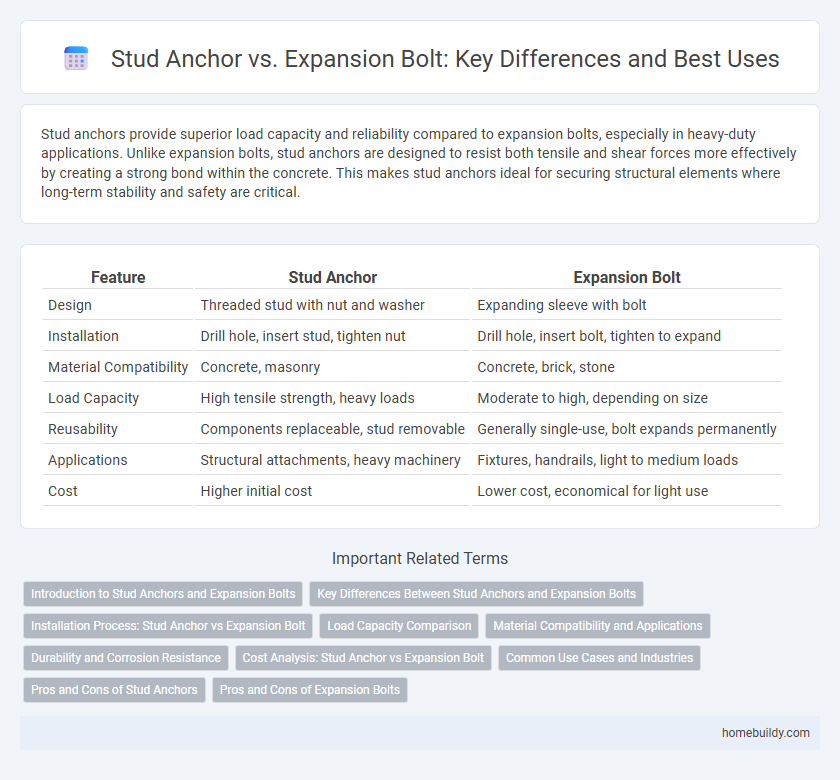Stud anchors provide superior load capacity and reliability compared to expansion bolts, especially in heavy-duty applications. Unlike expansion bolts, stud anchors are designed to resist both tensile and shear forces more effectively by creating a strong bond within the concrete. This makes stud anchors ideal for securing structural elements where long-term stability and safety are critical.
Table of Comparison
| Feature | Stud Anchor | Expansion Bolt |
|---|---|---|
| Design | Threaded stud with nut and washer | Expanding sleeve with bolt |
| Installation | Drill hole, insert stud, tighten nut | Drill hole, insert bolt, tighten to expand |
| Material Compatibility | Concrete, masonry | Concrete, brick, stone |
| Load Capacity | High tensile strength, heavy loads | Moderate to high, depending on size |
| Reusability | Components replaceable, stud removable | Generally single-use, bolt expands permanently |
| Applications | Structural attachments, heavy machinery | Fixtures, handrails, light to medium loads |
| Cost | Higher initial cost | Lower cost, economical for light use |
Introduction to Stud Anchors and Expansion Bolts
Stud anchors provide a reliable fastening solution by embedding threaded rods into concrete or masonry, offering strong tension and shear resistance ideal for structural applications. Expansion bolts, designed to widen and grip the surrounding material when tightened, ensure secure anchoring mainly in solid substrates such as concrete and stone. Both fasteners serve critical roles in construction, with stud anchors favored for heavy-duty loads and expansion bolts preferred for versatile installation in various solid materials.
Key Differences Between Stud Anchors and Expansion Bolts
Stud anchors provide superior load distribution by embedding the threaded rod deeply into the base material, ensuring greater pull-out resistance compared to expansion bolts. Expansion bolts rely on mechanical expansion within a pre-drilled hole, making them more suitable for lighter loads and non-tensile applications. Stud anchors are preferred in heavy-duty construction projects requiring high tensile strength, while expansion bolts offer easier installation and flexibility for medium-duty fixing needs.
Installation Process: Stud Anchor vs Expansion Bolt
Stud anchors require precise drilling and chemical adhesive application for secure fixing, ensuring high load capacity in concrete installations. Expansion bolts involve drilling a hole and mechanically expanding the bolt within the substrate, providing rapid installation but potentially less holding strength under dynamic loads. Installation of stud anchors demands more preparation and curing time compared to the quicker, straightforward expansion bolt setup.
Load Capacity Comparison
Stud anchors generally offer higher load capacity compared to expansion bolts due to their deeper embedment and superior mechanical interlock with concrete. Expansion bolts rely on surface friction and expansion force, limiting their load capacity in tensile and shear applications. For heavy-duty structural connections, stud anchors provide more reliable and consistent performance under dynamic and static loads.
Material Compatibility and Applications
Stud anchors, typically made from stainless steel or carbon steel, offer superior material compatibility for various substrates including concrete, masonry, and steel structures, whereas expansion bolts are generally limited to concrete and solid masonry applications. The corrosion resistance of stud anchors allows for extensive use in both indoor and outdoor environments, especially in marine or chemical-exposed settings. Their versatility makes stud anchors ideal for heavy-duty load-bearing applications like structural steel connections and machinery anchoring, where expansion bolts may fail due to material incompatibility or environmental exposure.
Durability and Corrosion Resistance
Stud anchors offer superior durability compared to expansion bolts due to their solid, one-piece construction, which reduces the risk of failure under heavy loads and vibrations. They are typically made from high-grade stainless steel or coated materials, providing enhanced corrosion resistance in harsh environments, especially in marine or industrial applications. Expansion bolts often suffer from corrosion over time as their multiple components and internal moving parts trap moisture, leading to reduced lifespan and structural integrity.
Cost Analysis: Stud Anchor vs Expansion Bolt
Stud anchors generally offer a higher initial cost compared to expansion bolts due to their robust design and superior load capacity. However, the long-term cost benefits of stud anchors include reduced maintenance and increased durability, which can lead to lower replacement and repair expenses over time. Expansion bolts are typically more economical upfront but may incur higher lifecycle costs in heavy-duty applications or environments prone to vibration and stress.
Common Use Cases and Industries
Stud anchors are widely used in heavy-duty construction and industrial applications requiring high load-bearing capacity, such as steel fabrication, bridge construction, and large machinery installation. Expansion bolts are preferred in lighter-duty settings like residential buildings, drywall installations, and light equipment mounting due to their ease of installation and suitability for concrete and masonry substrates. Industries like oil and gas, infrastructure, and manufacturing rely heavily on stud anchors for their superior strength and durability under dynamic loads.
Pros and Cons of Stud Anchors
Stud anchors offer superior load-bearing capacity and are ideal for heavy-duty applications requiring high tension and shear strength, outperforming expansion bolts in structural stability. They provide excellent resistance to vibration and fatigue without the risk of concrete spalling, but installation demands precise hole drilling and proper curing for optimal performance. However, stud anchors may require more time and skill to install compared to expansion bolts, which are faster and simpler but less reliable under dynamic loads.
Pros and Cons of Expansion Bolts
Expansion bolts provide strong load-bearing capacity for heavy-duty applications, making them ideal for anchoring into concrete and masonry. They offer quick installation and high resistance to vibration but can cause damage to the substrate due to the expansion force. However, expansion bolts may not be suitable for hollow or softer materials and can be more challenging to remove compared to stud anchors.
Stud anchor vs expansion bolt Infographic

 homebuildy.com
homebuildy.com